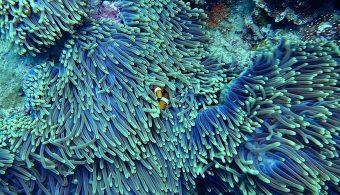
Coral reefs around the world are in a dire predicament, as warmer-than-usual waters are causing widespread bleaching and death among these crucial marine organisms. Now, more than 2,500 marine scientists and policy experts are urging the Australian government to protect the world’s largest and most well-known coral ecosystem: the Great Barrier Reef.
“Coral reefs … are threatened with complete collapse under rapid climate change,” the scientists, who last week attended the International Coral Reef Symposium in Hawaii, write in their letter to Australian Prime Minister Malcolm Turnbull. “Fifty percent of coral reefs have already been destroyed by a combination of local and global factors. Additional serious degradation will occur over the next two decades as temperatures continue to rise.”
The scientists also offer up a way to protect the Great Barrier Reef from future climate change: Get off coal.
“We call upon the Australian Commonwealth Government to stop endorsing the export of coal, and specifically to stop or revoke the approval of new mines, including those in Queensland, which have the potential to become the world’s biggest and most harmful single sources of atmospheric pollution,” they write.
One of the most controversial coal decisions Australia has made in recent years was October’s approval of the Carmichael coal mine. The mine, which will be located in central Queensland, has drawn the ire of environmentalists, who note that the emissions the mined coal will produce will worsen the climate change that’s causing coral bleaching — a process in which stressed coral expel the photosynthetic algae living in their tissues, and are left weakened and more likely to die if water conditions don’t go back to normal. Another concern is the shipping of coal from the mine through the Great Barrier Reef, which will require large channels to be dredged through the sea floor. This shipping channel, Vice has reported, could cause light and noise pollution and disrupt the breeding of sea turtles and migration of whales.
“Carmichael would be a complete disaster for the climate and the Great Barrier Reef,” Greenpeace Australia campaigner Shani Tager said in October.
Overall, Australia isn’t known for its swift action on climate change. The scientists note in their letter that the country, whose previous prime minister Tony Abbott called climate change “absolute crap,” is seen as a “laggard” on climate change. In 2015, that laggard status was confirmed in a report by the country’s Climate Council, which found that, while legislation to tackle climate change has been on the uptick globally, “Australia has become the first developed country to take a legislative step backwards from action on climate change” via the 2014 repeal of its carbon tax.
But taking steps to protect the Great Barrier Reef — including rethinking the Carmichael coal mine — would help. And already, Australia has made some progress: Last week, the Queensland government purchased a $7 million cattle farm that was responsible for sending huge amounts of sediment pollution into the reef each year. Under the government’s protection, the farm won’t be used for cattle grazing anymore, which is great news for the reef, as pollution and other added stressors make coral reefs more susceptible to threats caused by warming waters. And earlier this month, Prime Minister Turnbull announced a $1 billion fund aimed at protecting the reef from bleaching and other stressors.
But more needs to be done, as the scientists’ letter notes. And fast — this year’s bleaching event is the longest on record, and could stretch into a third year. Already, over a third of the corals in the Great Barrier Reef have died.
Source: www.thinkprogress.org

